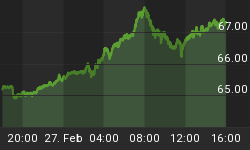As we write, the Euro-zone's finance ministers and representatives from the European Central Bank (ECB) are holding their regular monthly meeting in Luxembourg. The official record of these meetings is always very bland and respectful, but we suspect that the ECB people are getting an earful right about now.
The double-no vote on the hapless EU constitution has thrown the EU's politicians and those of the Euro-zone in particular, into a bit of a panic. Suddenly, the focus is back on things like economic fundamentals, and it's dawning on some of the ministers, particularly those from slow-growth economies, that things are not looking good. The Euro-zone business climate indicator has been heading south for the better part of a year, and is now back in negative territory (indicating a deteriorating business climate). The last time the ECB cut interest rates, in June 2003, this indicator stood at -0.7. In March it slid to -0.37 and shows every sign of weakening further. Real GDP growth in the 12-nation 'zone is forecast at a meager 1.4% this year. On the other hand, inflation has been running at or above the ECB's target of 2.0% for over a year.

Other data are pointing to another "rough patch." Today came the news that Germany's manufacturing orders dropped more sharply than expected in April due to a big slump in foreign demand. Overall orders fell 2.9% on the month, the third significant drop in four months. Total domestic orders slipped by 0.6% but foreign orders were down 5.2%. In contrast, orders for consumer goods were up 0.9% from March, with orders for domestic consumer goods up for the seventh consecutive month. In other words, just as private consumption may be firming in Germany, foreign demand is dropping - and the domestic economy is not yet on a stable enough footing to take up the slack if export demand starts to slide.

Numbers out of Germany matter for the ECB because Germany accounts for 29% of Euro-zone GDP. France accounts for 22% and Italy 18%. All three have stagnant economies and high unemployment. With an election likely in Germany in September and one possible in Italy, it's no surprise that the politicians there are getting jumpy and looking for a scapegoat. Two Italian ministers have suggested ditching the euro and returning to the lira - it won't happen, as the attempt would send Italy's credit premium soaring. Both ministers hail from the typically out-of-focus Northern League, which seeks to embarrass PM Berlusconi and score points with voters. Similarly, German Economy Minister Clements is lashing out at "high" Euro-zone interest rates because his SPD looks set to get clobbered by the voters in the fall.
And therein lies one of the biggest problems for the Euro-zone. The various politicians are all beholden to, and therefore address, domestic concerns. No-one has any stake in the fortunes of the 'zone as a whole - no-one except the central bank.
The ECB has been given the basically-impossible task of setting interest rates at a level that will ensure price stability across a 12-nation currency union, where business cycles are out of synch and fiscal decisions reside entirely with national authorities. The ECB's refi rate has been stuck at a mere 2.0% for two years, but still Germany struggles to grow (real GDP is forecast at no more than 1.4% this year). Meanwhile Spain, which accounts for 11% of the Euro-zone's GDP, is chugging along, likely to see at least 3.4% growth this year, but with inflation too high for comfort at over 3.0%. And Ireland (less than 2% of Euro-zone GDP) continues to flirt with over-heating (GDP growth could pass 5.0% again this year).
So, the ECB's policy stance is too tight for Germany, too loose for Spain, and "just right" for only a handful of tiny economies like Austria (3% of Euro-zone GDP) and the Netherlands (6%).
All of this leaves the ECB in a difficult position. It's sole mandate is price stability - nothing woolly about growth or job creation. Since its inception in 1999, and particularly now under President Trichet, the bank has fought hard to don the mantle of its most illustrious predecessor, the German Bundesbank. The "Buba" as it was known had a rock solid reputation as an inflation hawk, and was also the one institution that consistently scored highest in perceptions among regular Germans. Trichet would love that kind of kudos. He certainly sees the ECB as a bulwark against irresponsible politicians - particularly with France and Italy showing signs of getting even more obdurate about structural reform.
So now the ECB is desperate to get the politicians off its back by convincing them it is not deaf to calls for a rate cut while at the same time trying to convince the markets that the euro is not a dead duck. Hence, on Friday, the ECB's Chief Economist Otmar Issing, was quoted in a German business paper as saying that the bank's monetary policy strategy "does not rule out" a rate cut.
But, that is probably as far as the bank will go for now. The ECB still sees inflationary risks on the upside, particularly with oil prices so high, so the bank will hold its own against the politicians over the summer months.
Key will be the May-June-July data out of Germany and for the 'zone as a whole. If, by September, the economic news is still gloomy, we could see a revision of the ECB's inflation outlook - which, in turn, would give the bank some room to start seriously contemplating an interest rate cut. Even so, the refi rate is unlikely to come down until Q4 at the earliest.
Meanwhile, if the euro remains below $1.25 over the next few weeks, it will take a lot of the pressure off the ECB and save Trichet the embarrassment of appearing to "reward" profligate politicians.















